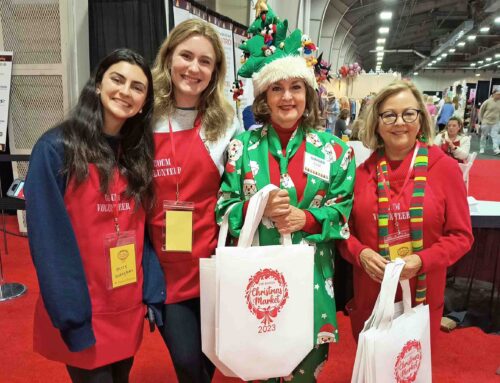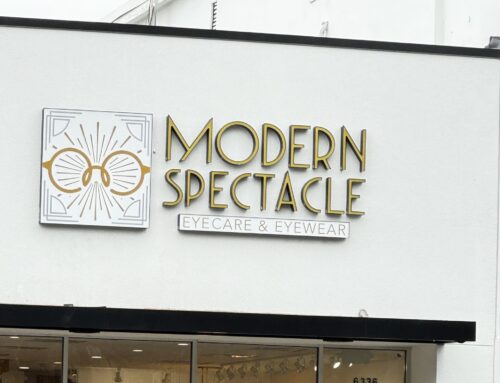When neighbors Stoney and Diana Savage moved into their storefront on Lower Greenville in January 2005, they hoped the third time would be the charm.
A few years had passed since the failure of Dillzone’s, Diana’s design accessories store near the Lakewood Shopping Center. The store had an ill-fated opening day — Sept. 11, 2001 — and never really recovered, Diana says. And though the couple’s wine and gift shop in an old Humble Oil station on Harry Hines had continued chugging along, the Savages knew they were limited by their tiny space and remote location.
So at the suggestion of customer Kathy McDaniel, who happened to be co-owner of The Grape, Stoney’s Fine Wines and Gift Shop moved in next door to the restaurant. The Savages knew it couldn’t hurt to share a city block with an eatery known for its wine list, but their newfound prime real estate also opened up a whole new can of worms.
“You’re kind of between a rock and a hard place if you’re in a great location,” Diana Savage says. “You’re going to pay a really high rent, and when you’re a mom and pop business, that’s really difficult.”
And location is only one issue. In a city where large corporations and chains keep springing up and squeezing out the little guys, it takes courage to open an independent business and tremendous effort to keep it open. Our neighborhood prides itself on being funkier and quirkier than the status quo, and most neighbors are quick to pledge their loyalty to our mom and pop shops. Yet there’s obviously not enough neighborhood support to keep businesses like Armhole and Impeccable Pig from being lured to the West Village and Snider Plaza, or places like Metro Retro from closing.
Still, many small business owners feel that our neighborhood is a good place to hang their hats, and whether they opened three decades ago or three years ago, they’re figuring out how to weather the downs and relish the ups.
Rud! Riffkind knows a thing or two about the ebb and flow of an independent retail business. Her American craft gallery, the Ole Moon, originally opened 28 years ago on Lower Greenville as a used books and music store with some furniture mixed in. When Riffkind took over the business in 1989, she began shifting the focus to art, gifts and handmade cards, and found quite a bit of financial success with this approach.
That lasted until the beginning of this decade, when the 9/11 attacks caused the economy to nosedive. Riffkind says her loyal patrons, including some who have frequented the store since it opened, kept her store alive during the recent slump. And one of her greatest challenges is the transition in our neighborhood — customers moving out, and people moving in who are unfamiliar with the store.
Another challenge, though Riffkind hates to say it, is her location. Her initial attraction to the store was that it wouldn’t blend into a strip mall, but by the same token, its location makes it a destination store, one that customers have to intentionally visit.
“It’s not like when you’re in a mall and someone walks by and says, ‘Oh, that’s clever. I think I’ll go in there.’ I don’t doubt that our business would thrive in a West Village. As far as our uniqueness, it would probably go gangbusters,” Riffkind says. “But I don’t feel like we would fit in. It just wouldn’t feel right. I still believe in the neighborhood concept.”
Location also is an issue for Charlotte Deaton, whose gift shop on Garland Road is often missed by drivers speeding past. Lucky for her, Dickey’s Barbecue recently moved in next door, and that’s provided some overflow traffic, Deaton says. But it’s the beauty salon in back of her store that really made the difference.
Deaton and her husband had worked side by side in their salon for 18 years when a 1999 car accident halted Deaton’s career. After two years of back surgeries and physical therapy, her neurologist told her she would have to change careers, and that’s when she decided to open Deaton’s Gift Shop.
“This was a passion that I’d had since I was very, very young, and I’d just never followed through. I’ve never taken any classes on displaying or merchandising at all. I just had that natural ability,” Deaton says. “You shouldn’t say that a car accident was a good thing, but for me it was.”
Like any startup, business was slow at first, but Deaton had the built-in luxury of customers who browsed on their way to and from their salon appointments. Pretty soon she needed more room, so the Deatons moved about a mile down Garland Road from their 1,000-square foot storefront to a 4,000-square foot space. Today, two and a half years after the gift shop opened, it’s raking in higher profits than the salon.
Being able to support a fledgling shop with an established business can be a great advantage. Not everyone has that luxury, says Elizabeth Mast, owner of gift shop Talulah Belle in the Lakewood Shopping Center. She started out with a small section in the shop selling customized dog collars and bought the business on a fluke.
“The women in the neighborhood, we don’t like going to the mall, and there wasn’t anywhere to run and get a quick pair of shoes or a piece of lingerie,” Mast says.
So she decided to fill that niche. Five years later, business is good, but the first years were tough. Luckily, Mast says, she had a thriving law practice to support her side job.
At any broadly defined business like a gift shop, owners are competing not only with dozens of other independent stores but also large discount and department stores. Riffkind says it’s an uphill battle to educate customers on the advantage of buying a $300 handmade vase rather than heading to Target and paying $49.95 for something mass produced. Savage faces the same problem trying to sell wine and liquor. She knows they can’t compete with places that carry large inventories such as Pogos or Goody Goody, so she has to rely on the fact that people will shop at their store for the added bonus of her husband’s wine expertise.
“Stoney has been studying wine since he could legally drink,” she says.
But the discount retailer competition is also the reason why they added gourmet food and gifts to the store’s inventory. People are grasping the concept, she says, which is all she can hope for with something as unique as a wine, food and gift shop.
“I think if we had researched it, we may not have done it,” Savage says. “If we had known this didn’t exist, we may have thought: ‘Oh, this shouldn’t exist. This is not a valid idea.’”
Sometimes it’s easier to have a much smaller niche, like Jim DeNoyer, owner of The Fan Man in Lakewood Shopping Center. The store opened at Knox and Travis about 30 years ago, and in the late ’80s, DeNoyer went to work for the original owner on a lark, just to learn about the repair and restoration of old fans. The workshop and museum moved to Lakewood in 1992, and DeNoyer bought the business in ’94.
Before the rise of Home Depot and Lowe’s, the store made tremendous profits selling imported ceiling fans, but now it focuses mainly on repair and restoration. That’s just fine with DeNoyer, because it’s a trade practiced by only a couple of other shops in the entire country.
His customers span the globe. A few years ago, Abercrombie and Fitch asked DeNoyer for fans reminiscent of the World War II era to place in its Hollister stores, and he’s currently refurbishing antique ceiling fans for an Alabama man in the process of restoring an antebellum mansion. He has also done quite a few projects for EuroDisney and Tokyo Disney.
DeNoyer says he receives a fair amount of business from neighbors, but because of his unique line of work, he doesn’t have to rely on local customers. It’s the opposite story for people such as the Savages, who depend on our neighborhood for business. Savage says she tailors her inventory to appeal to neighbors — adding cigars, for example, because so many people requested them, and choosing mostly products in the mid-range, such as $10 to $40 wines rather than cheap or expensive, because that’s what neighbors tend to buy, she says.
“Our old customers do not come to this store. We depended on businessmen or people who worked across the street at Centex. One guy with a really nice car told us, ‘I’m not driving on Lower Greenville,’” Savage says.
“I just think it takes a lot longer to build up a reliable clientele. People tell us that Lakewood people support Lakewood shops, and we think that’s true. We want to see more of that.”
Of course, other people have told Savage that people want to live in our neighborhood, not shop in our neighborhood, and some days she has an easier time believing that. But most days she doesn’t at all regret their decision to open the store. They had talked about it for so long, and “there’s a million good ideas out there that are never realized,” Savage says.
Plus, nothing compares to doing what you love. People can work their entire lives and make a lot of money, DeNoyer says, but it means nothing if the job satisfaction isn’t there.
“Before this, I was a CPA and had risen up through the ranks over the years. That’s the goal when you’re working your way up through management, to get to upper management.
“Honestly, the further up I went, the less satisfaction there was to the job,” he says. “To find something that you wake up and you’re ready to go in, I wouldn’t trade that for anything. I don’t know how you could.”
DeNoyer says his workshop, where he gets to “play,” provides just that. He jokes about his dreams of winning the lottery, but admits that it wouldn’t change much.
“If I won,” he says, “I’d still be here.”





